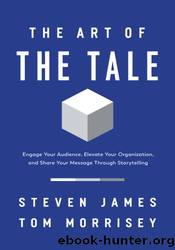The Art of the Tale by Steven James

Author:Steven James [James, Steven]
Language: eng
Format: epub
Published: 2022-06-09T00:00:00+00:00
Thereâs a saying that you understand someoneâs culture when you understand what makes them laugh. Thereâs a lot of truth to that. Watch and listen to the reaction of your listeners. When considering using dialect or colloquialisms, ask, âWill this offend those who speak in this dialect, or will it affirm them?â Usually, imitating someoneâs dialect is not a good idea.
But what if you donât know your listeners that well? What if youâve never met them before?
Look for (1) bridges between their culture and yours, (2) similar struggles you have, or (3) shared experiences you can tap into.
When I was storytelling in India, I found that some of my word-play humor didnât make sense to my listenersâespecially when translated into Telugu or Hindi. However, the family unit is highly valued in India and I soon discovered that when I told stories about my children, the faces of my listeners brightened up. It was common ground.
By the way, the more confident you are when you tell your story, the more youâll put your listeners at ease. Thereâs something very reassuring about someone whoâs comfortable being himself. As famed improv instructor Keith Johnstone told me once, âWhen a great performer steps onstage, audiences relax.â A little confidence with a dash of humility goes a long way in bridging communication gaps between cultures, and between you and your listeners.
Also, let your audience know that they have permission to laugh at what youâre saying. These days, some people are so sensitive about the prospect of offending others that they begin to feel uneasy if you mention any differences between various demographic groups. The listeners (rightly!) donât want to laugh if youâre making fun of others or putting them down; however, they havenât necessarily been taught discernment that just because weâre pointing out differences between individuals doesnât mean weâre judging anyone. Help your listeners to relax and rest in the confidence that youâre simply here to connect with them, not to mock or demean anyone.
TRUST YOUR AUDIENCE
After my daughter Ariel got her first pet, a hamster, I drove her home and we were setting up the hamster cage and the squeaky-spinny-wheel-deal when she turned to me. âIâm naming him Sniffer,â she announced in her enthusiastic, eight-year-old way, âbecause thatâs the second thing he did when I put him in my hand!â When I tell the story, I say, âItâs just a good thing she didnât name him after the first thing he did in her hand.â
Do I need to tell the audience that he pooped in her hand? Probably not.
Avoid overexplaining.
Often, listeners will âget it,â and the more you explain the point, the more impact you drain from it.
Sportscasters rarely ask questions that they donât already know the answer to. You have a newscaster at the Olympics and the second-place swimmer is climbing out of the pool: âYou just lost a gold medal by a hundredth of a second. Whatâs going through your mind?â
âIâd like to take that microphone and shove it up yourââ
âAnd now back to you, Bob, at the studio.
Download
This site does not store any files on its server. We only index and link to content provided by other sites. Please contact the content providers to delete copyright contents if any and email us, we'll remove relevant links or contents immediately.
Cecilia; Or, Memoirs of an Heiress — Volume 1 by Fanny Burney(32546)
Cecilia; Or, Memoirs of an Heiress — Volume 2 by Fanny Burney(31943)
Cecilia; Or, Memoirs of an Heiress — Volume 3 by Fanny Burney(31929)
The Lost Art of Listening by Michael P. Nichols(7492)
Asking the Right Questions: A Guide to Critical Thinking by M. Neil Browne & Stuart M. Keeley(5758)
We Need to Talk by Celeste Headlee(5608)
On Writing A Memoir of the Craft by Stephen King(4935)
Dialogue by Robert McKee(4389)
Pre-Suasion: A Revolutionary Way to Influence and Persuade by Robert Cialdini(4222)
I Have Something to Say: Mastering the Art of Public Speaking in an Age of Disconnection by John Bowe(3872)
Elements of Style 2017 by Richard De A'Morelli(3339)
The Book of Human Emotions by Tiffany Watt Smith(3300)
Fluent Forever: How to Learn Any Language Fast and Never Forget It by Gabriel Wyner(3077)
Name Book, The: Over 10,000 Names--Their Meanings, Origins, and Spiritual Significance by Astoria Dorothy(2978)
Why I Write by George Orwell(2944)
Good Humor, Bad Taste: A Sociology of the Joke by Kuipers Giselinde(2941)
The Art Of Deception by Kevin Mitnick(2796)
The Grammaring Guide to English Grammar with Exercises by Péter Simon(2740)
Ancient Worlds by Michael Scott(2682)
